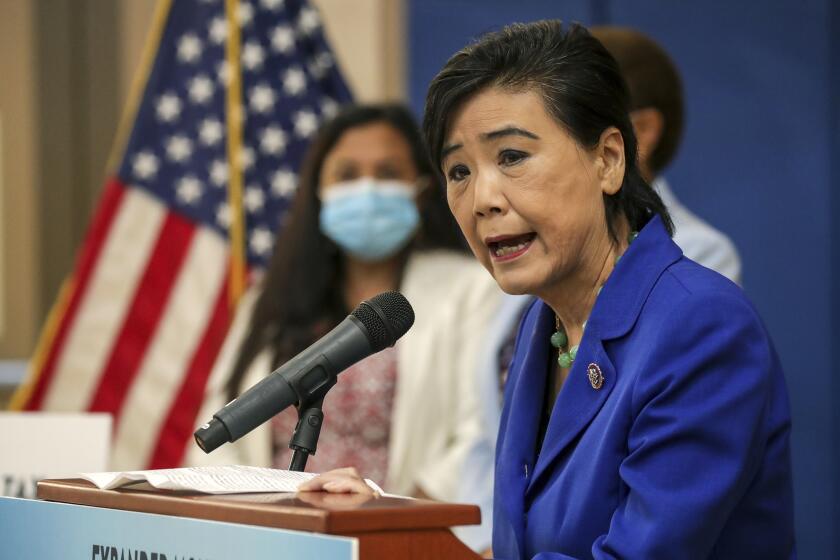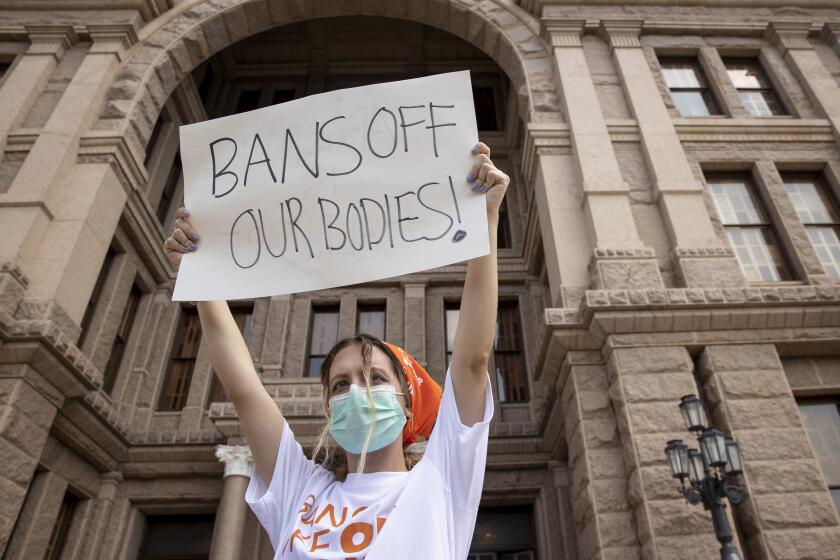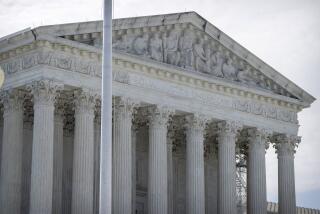Justice Department sues Texas over abortion law, cites ‘racial covenant’ case precedent

WASHINGTON — The Biden administration launched a broad legal attack on the new Texas antiabortion law, declaring Thursday the state has no authority to defy the Constitution and deprive women of their rights.
The law bans abortion after about six weeks, well before most women know they are pregnant, and represents the strongest challenge to abortion access in nearly 50 years.
Thursday’s lawsuit comes as the Biden administration has been facing pressure from Democrats to block the law, especially after the Supreme Court last week allowed it to take effect.
“The Department of Justice has the duty to defend the Constitution of the United States and uphold the law. Today we defend that duty,” Atty. Gen. Merrick Garland told reporters as he announced the lawsuit, which was filed in federal district court in Austin, Texas.
The Texas law, known as Senate Bill 8, prohibits abortions once medical professionals can detect cardiac activity.
Other states have attempted unsuccessfully to pass similar bans, but what distinguishes this one is that rather than giving the state responsibility, it essentially taps private citizens to enforce it, allowing them to sue medical professionals or others who assist in an abortion.
Democrats will try to enact a law to make abortion legal nationwide. It is likely to pass the House, but its path in the Senate is uncertain.
Plaintiffs can recover $10,000 or more in damages and have their legal fees reimbursed by the defendants.
The law is structured in a way that also makes it difficult to be challenged in court, frustrating abortion rights advocates and providers.
The Justice Department has filed an unusual lawsuit in a bid to block an even more unusual state law, basing its arguments on precedent from a landmark 1948 Supreme Court decision invalidating “racial covenants.” And it could work because the federal government, unlike private parties, can sue the state directly.
Usually, the government points to a federal law and sues someone for violating it. In this instance, however, the Justice Department took the big-picture approach. It said the Constitution protects individual rights, including the right to abortion, adding that federal law is “supreme” and overrides or preempts state law.
“The United States therefore seeks a declaratory judgment that S.B. 8 is invalid under the Supremacy Clause and the 14th Amendment [and] is pre-empted by federal law,” it said in its complaint. And the federal government “seeks an order preliminarily and permanently enjoining the State of Texas, including its officers, employees, and agents, including private parties who would bring suit under the law, from implementing or enforcing S.B. 8.”
The suit — called United States vs. Texas — makes a strong argument that “private parties” who are authorized to sue abortion providers are in fact “state actors” who are carrying out state law with the help of state judges.
Until now, abortion rights advocates have been stymied by the Texas law because they could not sue the state directly, and they did not know which private individuals to sue because no one had yet filed a lawsuit against an abortion provider. The Supreme Court, by a 5-4 vote, allowed the Texas law to take effect for largely the same reasons.
But the Justice Department’s suit challenges what it called the state “scheme” and argues the law is a blatantly illegal effort to violate established constitutional rights.
Texas Gov. Greg Abbott said the law gives women six weeks to seek an abortion. But that’s not really true. Here’s the biological reality of the challenged legislation.
“The United States has the authority and the responsibility to ensure that no state can deprive individuals of their constitutional rights through a legislative scheme specifically designed to prevent the vindication of those rights,” Garland said Thursday.
The suit relies on the Supreme Court’s 1948 decision declaring unconstitutional the “racial covenants” that were often attached to deeds and prevented African Americans, Jews and others from purchasing a home. These racist provisions had survived for decades because they were defended as private contracts, not state laws that violated the Constitution’s guarantee of equal treatment under the law.
But in Shelley vs. Kraemer, the Supreme Court rejected that subterfuge and said these deed restrictions were enforced through state courts and, therefore, were actions of the state.
In Thursday’s lawsuit, the Justice Department said the same is true of the Texas antiabortion law.
“Thus, while Texas has gone to unprecedented lengths to cloak its attack on constitutionally protected rights behind a nominally private cause of action, it nonetheless has compelled its judicial branch to serve an enforcer’s role.”
University of Texas law professor Steve Vladeck said the government will need to obtain a broad court order blocking the state measure.
“The trick is how to get the right relief against the right defendants,” he tweeted. “A declaratory judgment against Texas is a good start, but it is not clear how a court can enjoin everyone from enforcing it.”
President Biden last week called the new law “almost un-American” and asked his Justice Department to examine whether it had any power to have it invalidated.
“I have been and continue to be a strong supporter of Roe v. Wade, number one,” Biden said. “And the most pernicious thing about the Texas law, it sort of creates a vigilante system.”
Abortion rights advocates said the Texas law violates the Roe vs. Wade decision, which overturned a Texas abortion ban in 1973 and said women had the right to end a pregnancy.
Abortion opponents have hailed the law as a turning point for the movement in America.
James Bopp Jr., general counsel for the National Right to Life Committee, said the lawsuit was “unquestionably a political statement” that posed no legal threat to the Texas law.
“You have the Biden administration pandering by taking the most extreme positions imaginable,” Bopp said. He dismissed Garland’s claim that the Texas law was a “scheme” designed to make it hard to challenge in court. “There’s nothing in the Constitution that prohibits ‘schemes,’” he said.
Following Garland’s announcement Thursday, Helene Krasnoff, vice president for public policy and litigation at Planned Parenthood Federation of America, said the abortion rights advocacy group was “heartened to see the Biden administration stepping in” because the Texas law “flies in the face of 50 years of precedent and has made abortion virtually inaccessible in the state of Texas.”
Times staff writer Janet Hook contributed to this report.
More to Read
Get the L.A. Times Politics newsletter
Deeply reported insights into legislation, politics and policy from Sacramento, Washington and beyond. In your inbox three times per week.
You may occasionally receive promotional content from the Los Angeles Times.














